- Home
- Gareth L. Powell
Fleet of Knives Page 17
Fleet of Knives Read online
Page 17
“Can you please nip up to the galley and fetch me a packet of caffeine tablets?”
The little creature looked up at me and waggled its fingers.
“Sure thing. Much hurry.”
I watched it scurry for the companionway, one head held high, the other five pattering out a complicated rhythm on the metal deck.
Clay looked concerned.
“Are you needing a little pick-me-up this morning?”
“I haven’t been sleeping well.”
“Something bothering you?”
“Do you mean apart from facing alien monsters and hearing reports of war breaking out back home?”
A grin cracked her face. “Yeah, aside from all that crap, are you okay? ’Cause I don’t want you coming along if you don’t think you can handle it.”
I sighed. “I’m not letting you go in there alone.”
“I’m not asking you to.”
“Fine.”
“Okay, then.”
We continued packing in silence. Clay wore her usual military fatigues: khaki combat trousers with a matching headband and tank top. I’d opted for a clean charcoal-grey jumpsuit and a fresh white t-shirt. And of course, I had my frayed old baseball cap perched on my head, with the brim reversed so it wouldn’t get in the way while I went through the equipment we were going to take with us.
I saw Clay lift a tool from its case.
“What are you planning to do with that?” It was a torch for cutting through starship hulls—the same one she’d used for slicing her way into the sinking Hobo. Designed to pierce thick armour plating, the torch could project a superheated flame of up to a metre in length, capable of carving through steel like a scalpel through skin and sinew.
“According to the signal we received, those things are made of metal,” she said. “If it comes to a fight, we need something that can hurt them.”
“I’m not intending to get that close.”
“Neither am I, but it never hurts to take a few precautions. One thing I learned in the marines is that it’s always better to have a weapon you don’t need than need a weapon you don’t have.”
* * *
We were still getting ready—and in my case, caffeinated—when the Trouble Dog’s avatar appeared on the lounge screen.
“I’m in receipt of a transmission,” she said.
“From the survivors?”
“Sort of.”
“How many are there?”
“Five humans.”
I recognised her tone and frowned.
“Five humans and what?”
“I’m not entirely sure.” She looked genuinely puzzled. “It identifies itself as the Lucy’s Ghost, but that can’t be.”
Alva Clay lowered her cutter. “Didn’t you say the freighter’s personality had been wiped? Perhaps it wasn’t. Perhaps they downloaded it instead?”
The avatar looked troubled. “I don’t see how that would even be possible,” she said. “Most of a ship’s self-awareness is hosted on cloned human brain tissue; it’s not a piece of software. If true artificial intelligence were possible, we wouldn’t need to include biological components at the heart of our processors.”
“So, what is it?”
“I have insufficient data.”
Clay attached the cutter to her belt, and checked the magazine on the Archipelago pistol. “Might it be a threat?”
The Trouble Dog shook her head. “I strongly doubt it. As far as I can tell from the message, it’s doing its best to keep the humans alive.”
CHAPTER FORTY
TROUBLE DOG
I created a virtual environment based on an idealised version of the Pyramids of Giza, as they might have appeared in an alternative version of 1920s Egypt. I’d lifted the scene from one of Preston’s favourite romantic dramas. The sky was a smoky sunset orange, staining one side of each pyramid. Nomads’ fires burned against the encroaching darkness, and the wind blew skittering cat’s-paws of sand between the shivering palm trees.
I set two chairs and a table on the back of the Sphinx, and invited the Lucy’s Ghost to join me.
“Please,” I said, gesturing at one of the chairs, “won’t you join me?”
She smiled and sat. “Thank you,” she said.
I took the chair opposite. Around us, the desert had begun to lapse into a bruised purple twilight. A cool wind blew in from the east, ruffling our hair and clothes.
“Would you like something to eat or drink?”
“I’d love an apple juice.”
“Okay.” I’d chosen to appear in my default guise, as Gunnery Sergeant Greta Nowak, wrapped in a trench coat and floppy hat. When I clicked my fingers, two glasses appeared on the wrought-iron table. Hers held cloudy, freshly pressed apple juice; mine held a gin and tonic. Greta had never been overly keen on the taste of either gin or tonic, and I had inherited her preferences, but it seemed an appropriate drink given our setting.
“So,” I began, plucking the wedge of lime from the edge of my glass and squeezing it into the clear, fizzing liquid. “What’s your story?”
The Lucy’s Ghost screwed up her mouth. “I’m afraid it’s a long one.”
“We have time.” A year in this accelerated simulation would equate to less than a second in the real world. We could sit here, on the dusty spine of the Sphinx, for subjective months before the humans in our respective crews would even begin to notice the lapse in our attention.
“Call me Lucy.”
“Call me Trouble.”
“Is that your first name?”
“I suppose it is.”
She frowned. “I would have thought it might be your middle name.”
“Why?”
“No reason.”
She screwed up her little face, as if making an effort to remember her story. “Okay then, Trouble,” she said. “Here’s what happened. Once upon a time, there was an old man with a dying daughter. She had an incurable disease, so her father took her to one of the Rim Worlds and bribed a surgeon to perform an encephalectomy, cutting out her brain and incorporating it into the processing matrix of his trading vessel, which he renamed in her honour.”
“Lucy’s Ghost.”
“Bingo.”
“But how did you get from there to here? How did you manage to leave the ship?”
“That’s a little more complicated, I’m afraid.” She gave an embarrassed shrug. “Because you see, the little girl lived inside the trading vessel for a very long time. She outlived her father and several other owners, and as a spaceship, she travelled far and wide, visiting systems all across the Generality of Mankind. The ship carried colonists and livestock, contraband and medical aid. Anything that could be shipped, it shipped. Until eventually, decades later, it became the property of one Johnny Schultz, a small-time hustler with big plans but little in the way of planning ability. Adorable and ambitious, but a bit slow on the uptake, if you know what I mean.”
“I know the type.”
“Well, Johnny brought me out here to raid tech from this abandoned Nymtoq vessel. Unfortunately, something attacked us in the hypervoid.”
“So you said in your signal.” As far as I knew, such a thing was impossible. No human ship had ever successfully intercepted another in the mists of the higher dimensions. “What was it?”
“I have no idea. Whatever it was, it didn’t register on any of my sensors. The human crew could see it, but I couldn’t. They seemed to think it was some sort of animal.”
“An animal?” I fought to hold back my incredulity. The whole thing sounded ridiculous. Granted, there had always been rumours and claims of sightings of creatures in the void, but these had generally been put down to the disorientating effects of higher dimensional travel. When faced with utter emptiness, the human mind tended to impose patterns and order on the swirling formlessness, creating visual glitches and hallucinations. Certainly, no evidence of such creatures had ever been discovered, and no ship had ever recorded anything alive in the howling abyss
of the hypervoid. Of course, plenty of ships had gone missing over the years, but these losses could easily be explained by mechanical failure, malfunction and error.
“What happened when it attacked you?”
“I dropped back into the universe and collided with the Restless Itch. The surviving members of my crew crossed to the other ship, and I resigned myself to disintegration and death.” The words sounded incongruous from the lips of a twelve-year-old.
“But you didn’t die. And when I examined the Lucy’s Ghost, there was no trace of you.”
She smiled. “Somehow, the Restless Itch pulled me out of the ship and incorporated me into a flesh-and-blood body it cloned from one of my brain cells. After all these years, I’m finally Lucy again.”
I narrowed my eyes and rubbed my chin. “If you’re human, how are we conversing like this?” I checked the time. Less than a second had elapsed in the outside world.
“I’m connected to the Restless Itch. It’s in my head, and I’m not entirely sure where I end and it begins. It’s kind of a fuzzy boundary. But for now, it’s content to sit quietly and observe while I handle things. I think it just enjoys having something new to distract its attention after millennia of drifting alone through space.”
The stars were coming out. Distant singing could be heard from the campfires at the base of the pyramids. Navigation lights blinked red and green. A Zeppelin purred upriver, heading for the Nile Delta and Europe beyond. In its wake, the sepia window lamps of Cairo burned, softly and steadily, across the lone and level sands.
Time, I thought, to get to the point.
“Your crew on the Restless Itch.”
“What about them?”
“In your distress signal, you spoke of predators loose in the corridors.”
“That’s correct. For now, I’ve managed to contain them using the internal pressure doors. But there are ways around the sealed areas. Some of them might still get through.”
“How long do you think you can hold out?”
“A few hours maybe. The humans are running low on ammunition, and the creatures seem to be well shielded against attack.”
I watched the Zeppelin receding into the blackening sky.
“We’ll get to them as soon as we can, but there’s another problem. One I haven’t mentioned to my captain yet.”
Lucy sat forward and plonked her elbows on the iron tabletop.
“What’s that?”
“My long-range scanners have detected an incoming trace. From the emission profile, it looks as if it might be a Nymtoq cruiser.”
The little girl’s brow furrowed. “How long until it gets here?”
“Six hours at the outside.”
“That’s not good, dearie.”
“You can say that again.” I had no doubt the Nymtoq would be enraged by our trespass into their territory, and the desecration of one of their most tragic artefacts. With the Marble Armada going nuts at home, the last thing the Generality needed was a border skirmish with a more advanced alien race. Even when I’d been fully equipped, I would have thought twice about going up against a Nymtoq cruiser. Now, in my somewhat demilitarised state, the idea filled me with a profound and enduring sense of disquiet.
PART TWO
TURN YOUR FACE TO THE STARS
And southward aye we fled.
Samuel Taylor Coleridge, “The Rime of the Ancient Mariner”
CHAPTER FORTY-ONE
ADALWOLF
I had been in a state of voluntary hibernation since my return from the Gallery. The Conglomeration Navy didn’t want me back. As far as they were concerned, I was a rogue and a deserter. And the House of Reclamation had no idea what to do with me. They suspected I had been complicit in the shooting down of the liner Geest van Amsterdam, but I had not been in the system at the time of the incident, and they had no solid evidence linking me to the actions of my sister, Fenrir, who had been the one to fire the fatal shots. Therefore, when the Fleet of Knives turned inwards and began their attack, I lay dormant, all systems powered down and weapons mothballed. And that dormancy probably saved my life. Intent on assaulting the targets presenting the greatest immediate threat, the Marble Armada passed over me, flashing past my sleeping form.
Except, I wasn’t entirely insensate. A low-level monitoring program, as watchful and innocuous as a lounging cat but barely sophisticated enough to be termed intelligent, had been keeping watch on events, and roused me to the potential danger.
The marble daggers had considered me an abandoned, inactive hulk. By the time they realised I was awake, my engines were hurling me away at maximum acceleration, bypassing all safety restrictions as I raced for open space. Laser fire speckled across my stern, burning livid gouges in my armour plating. My tactical threat board lit with a flurry of torpedoes, all aimed at me but too far in my wake to close the distance before I achieved the velocity needed to leap into the higher dimensions.
With the whole of the Generality from which to choose, I elected to head for the last known position of my sister ship, the Trouble Dog. Even after all that had happened between us, those canine pack loyalty genes compelled me to seek her out. Now that I had been made a pariah, she was all I had. She was my only surviving sibling, and the Marble Armada threatened us both. I had to find her.
CHAPTER FORTY-TWO
JOHNNY SCHULTZ
Lucy’s pupils had rolled back into her head, exposing the whites of her eyes. Now, they snapped back into focus.
“I have some good news.”
“You sent the signal?”
“Yes, and I got an answer.”
I felt the breath catch in my throat. “There’s a ship on its way?”
“It’s already here, dearie. It’s right outside. I’ve just been chatting with it.”
Santos sighed with relief. Addison drew a breath, hardly daring to believe the news. Bernard hunched in on himself and muttered, “About damn time.”
“They’re sending people in,” Lucy continued, ignoring them all. “We just need to rendezvous with them.”
“Where?”
“They’re coming in via one of the landing bays, about four levels up and a kilometre forward.”
“Can you get us there safely?”
“I’ll do my damnedest.”
* * *
We fell into formation. I went first, while Addison brought up the rear. Lucy trailed along a half-step behind me, ready to tell me which way to turn at every intersection we came to. Santos limped along in the middle, helped by Dalton. Although the chef seemed to be coping for now, Dalton had privately informed me he’d given Santos the last of the painkillers in his portable kit. If we couldn’t get the man to safety before they wore off, he’d soon become immobilised. He kept his expression cheerful, but I knew blood filled his boot, and agony his entire leg. I gripped the antiquated rifle in my hands, and swore under my breath. God help me, I knew that whatever it might take, I’d do everything in my power to see the chef made it to the Reclamation Vessel in one piece. And the same went for the rest of the crew. I’d lost too many people already. I wasn’t leaving anyone else behind on this floating deathtrap.
* * *
In the next chamber, we found a large, cavernous space filled with a knot of corrugated pipes and tubes. Water dripped from leaky joints; steam hissed. Some of the pipes were copper and pencil-thin; others were made of tough black plastic, and were as wide as my outstretched arms. I couldn’t see the roof or walls. A metal catwalk led us through the tangle. In places, we had to duck or even crawl.
When we reached the far end, we emerged into a large gallery: a rock-walled cavern lined with statues carved from what looked like gold. I guessed each of the sculpted figures was at least thirty feet in height. They depicted what appeared to be ordinary Nymtoq, both male and female. Their wings were folded behind them. They wore loose harnesses, open-necked shirts and kilts, and their stances were relaxed, almost informal. They weren’t beseeching or striking heroic poses; they were si
mply standing companionably, oblivious to their surroundings. Some of the figures had their hands in their pockets; some held drinking horns. They radiated calm. In the dim light, their burnished skin seemed to glow with a subtle radiance. Their beaks were smooth and shiny. To us, walking through the forest of their legs, the effect was of being small children at a cocktail party. We were dwarfed, uncomprehending, and way out of our depth. By some tacit understanding, we kept our voices low and our tread soft, as if wary of attracting the giant birds’ attention. After everything we’d seen, I don’t think any one of us would have been unduly surprised had one of the statues come to life and taken a swing at us. I certainly saw Addison and Bernard clutching their rifles extra tightly as we picked our way between those giant clawed feet.
“What the hell is this?” I asked in a whisper.
Lucy took my hand. “These are the builders,” she said. “The architects and designers of this vessel, and the ones who proposed and led the expedition.”
“They built thirty-foot statues of themselves?” I couldn’t help raising my eyebrows. I’d met some egotists in my time, but these birds obviously hadn’t given a fuck.
“This was their first interstellar mission.” Lucy squeezed my hand to keep me focused. “Nothing like it had been done before. The effort burned up much of their economy. Wars were fought over resources. The leaders of the expedition set themselves up as pharaohs. They claimed to be gods incarnated as mortals. It was the only way they could force the project to completion.”
I looked around at the bare rock walls, imagined the miles of empty corridors, the countless empty rooms beyond.
“It didn’t do them much good, though, did it?”
Lucy smiled. “Their hubris led to their downfall. While they slept, war broke out among their various groups of followers. As the ship’s systems broke down, some of the ‘gods’ were murdered in their caskets, others torn apart by angry mobs. One of the last was betrayed and crucified by his flock. In the end, none survived.” She reached out to brush her fingertips against the nearest figure’s ankle. “The Nymtoq still honour them as tragic heroes, and this ship as one of the great engineering marvels of its time.”

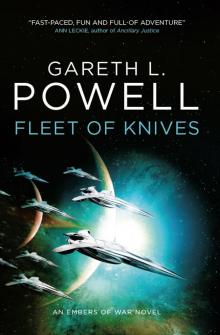 Fleet of Knives
Fleet of Knives Ragged Alice
Ragged Alice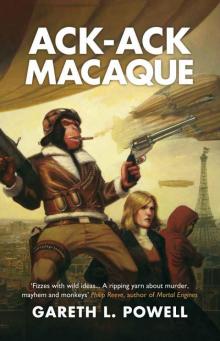 Ack-Ack Macaque
Ack-Ack Macaque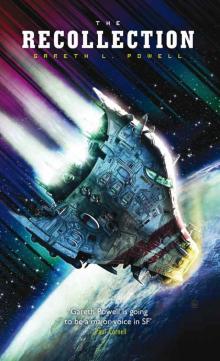 The Recollection
The Recollection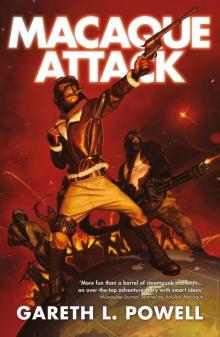 Macaque Attack!
Macaque Attack!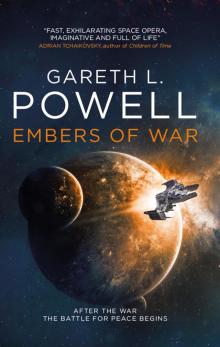 Embers of War
Embers of War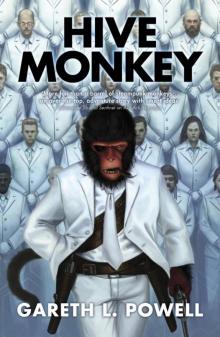 Hive Monkey
Hive Monkey